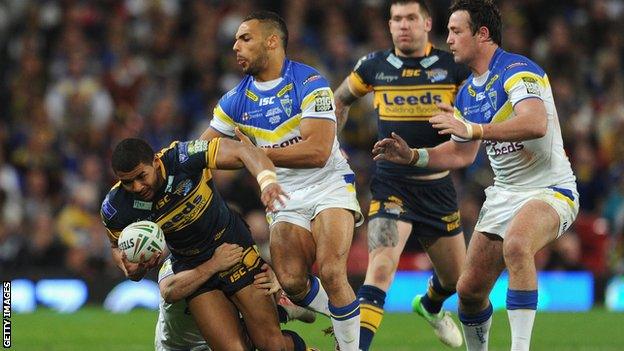Super League clubs £68.5 million in debt, a BBC investigation finds
- Published

Rugby League
Super League clubs are facing combined debts of £68.5m, a BBC Inside Out investigation alleges.
"There are too many teams generating insufficient turnover and generating too much cumulative debt," sports finance expert Rob Wilson said.
However, the Rugby Football League said the debt should be put into context.
"Rugby League's health compares favourably to every other major sport," RFL director of standards and licensing Blake Solly said.
"Attendances were at an all-time high in 2012, more people saw the game on television than ever before and the RFL was able to make record levels of financial disbursements to clubs."
Sheffield Hallam University sports finance specialist Wilson , externallooked at the balance sheets of 11 of the 14 Super League clubs and found a huge financial disparity between them.
Wilson added: "Our findings indicate that there is a cumulative net debt of £68.5m among the Super League clubs with three or four clubs performing well.
"The remaining clubs appear to make annual losses which contribute to the net debt position, some just about wash their faces financially while others appear to have lost control of their spending.
"In my opinion, this is due to seeing the salary cap as a target rather than the limit which is intended. The mentality seems to be that if you want to perform well on the field of play you have to spend up to the cap.
"Two of the clubs examined had significant levels of net debt and, if these are removed from the sample, we can conclude an average net debt of around £3m per club.
"Of course, there are clubs in the league structure who make a profit and it is their business model that others should seek to utilise."
The RFL signed a deal with Sky television in August 2011, external that guarantees the sport an income stream in excess of £90m over five years but Bradford Bulls and Salford Reds have had financial difficulties in the last six months.
Wilson examined the latest accounts available at Companies House of 11 Super League clubs, and discovered that they had a cumulative debt of more than £60m.
"The overall effect of that is that the league itself will struggle for finance. Using a term like 'Rugby League is staring at the financial abyss' is not too harsh a thing to say," he continued.
Of the three Super League clubs not included in the study, one, the Catalan Dragons are registered in France,
The Super League season starts next weekend without a sponsor in place, and Hull Kingston Rovers chairman Neil Hudgell feels that his own club's financial position has worsened in the last 12 months.
He said: "I think probably on the whole it's a little bit worse than it was last year. Every year we make a loss and every year as directors we've funded that shortfall. I think it'd be very hard for us to argue otherwise than we live beyond our means."
Gary Hetherington, chief executive of Super League champions Leeds Rhinos, says that the sport is fundamentally a strong product and insists that financial management needs to improve at club level.
"The product on the field has never been better, the crowds are very strong, the TV audiences are very strong, the game itself is as good as it's ever been," he said.
"We don't want that overshadowed by incompetence at club level - and that's what we've seen in recent years.
"We need to rid ourselves of poor management practices. All clubs have a real responsibility, a real role to play. The majority of clubs are working hard. It's some of the others that have let the sport down, quite frankly."
In a year that sees England host its first World Cup, external since 2000, the RFL says that it is working with Super League clubs to help them improve their finances.
Solly said: "2013 will also see more commercial income flow into Rugby League than at any time in its history and with a growing stable of sponsors and partners on board, the sport is approaching the new season with confidence.
"The salary cap and licensing have both brought the stability that is allowing many clubs to operate profitably and helping attract the new investors who are coming into Super League. However the ultimate responsibility for the performance of any club rests with the individual club and its directors."
BBC Inside Out Yorkshire and Lincolnshire and BBC Inside Out North West, presented by George Riley, will be shown on Monday, 28 January on BBC One at 19:30 GMT. The programme is also available on the BBC iPlayer.
- Published18 January 2013
- Published31 December 2012
- Published27 March 2012
- Published24 January 2012